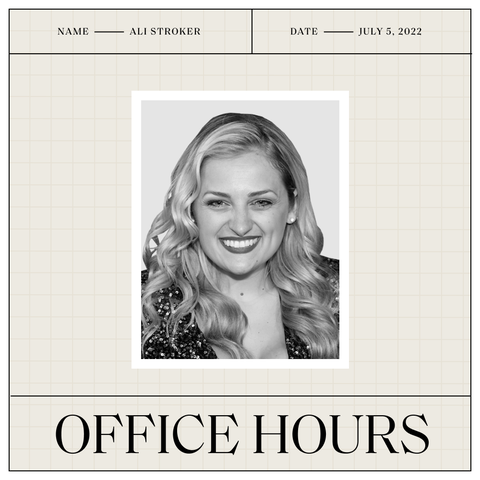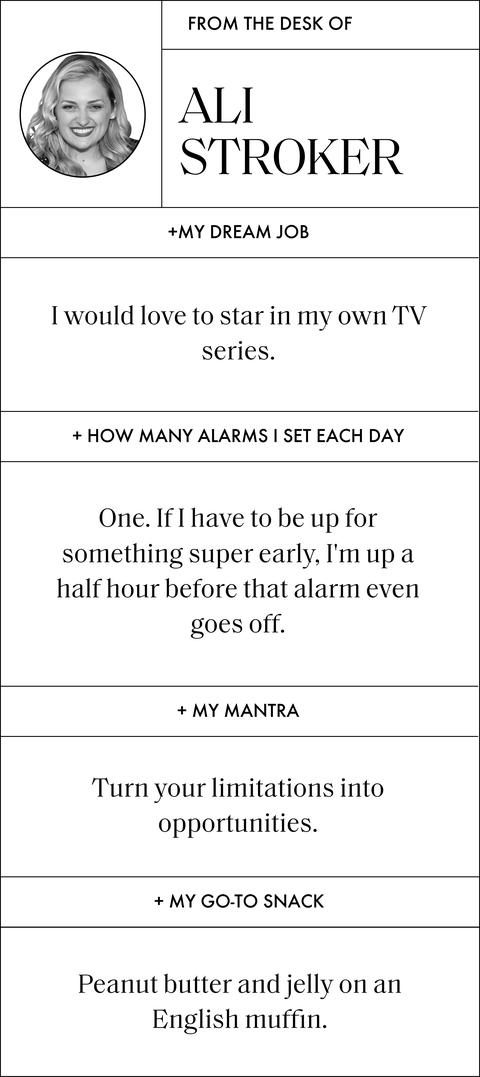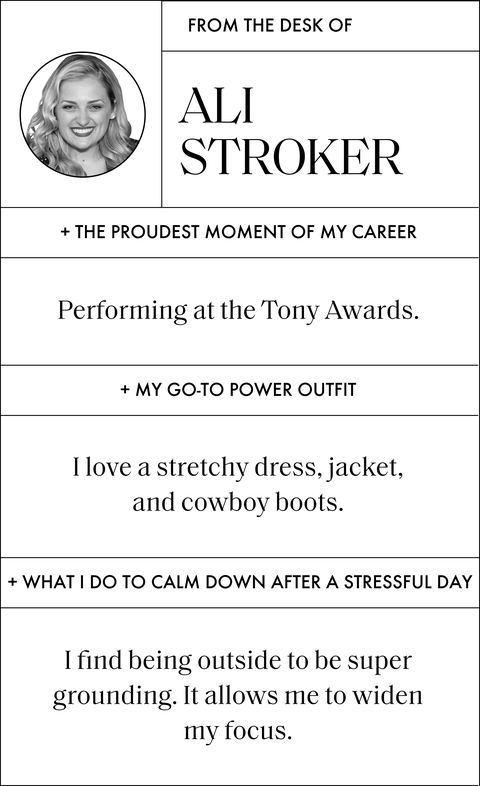In ELLE.com’s monthly series Office Hours, we ask people in powerful positions to take us through their first jobs, worst jobs, and everything in between. This month we spoke with Ali Stroker, the actor, singer, and dancer who first burst onto the scene in 2012 in the reality show The Glee Project. Since then, Stroker has popped up in series like The Bold Type and Only Murders in the Building, while also earning a Tony Award for her performance in the musical Oklahoma! and becoming the first actor in a wheelchair to appear on Broadway via the 2015 revival of Spring Awakening. Currently, you can find the New Jersey-born thespian playing Anne in Free Shakespeare in the Park’s production of Richard III, a role she calls both “wonderful and difficult.” “It’s been exciting to be in my body and have my chair and allow it to inform the story that I’m telling,” Stroker tells ELLE.com about performing in theater. “We’re in a creative setting where there’s no one answer.” Below, the triple-threat pulls back the curtain on the rest of her career, including the best advice she’s ever received and the proudest moment she’s had thus far.
My first job
My first job was working at this T-shirt shop on the Jersey Shore called Breezin’ Up when I was 12. I loved it so much, because I love clothes, and I loved to fold. I learned about just being with people. I have always felt like giving people your full attention and your best self makes such an impact, not just on other people, but on your own sense of self and identity and confidence.
How I knew I was meant to be a performer
When I was seven, I was introduced to musical theater, and I was so in love with every single part of it. I knew I wanted to do it forever—I just didn’t always know exactly how and where I was going to do it. But I always knew that I was meant to, because it brought me so much joy. It was how I found myself. I was injured in a car accident when I was two, and I am in a wheelchair, so finding my identity and working through that and being a kid with a disability was really hard. Those challenges were in some ways addressed while I was performing. It was like I was able to practice being myself. I always felt like when I was out in the world, people would stare at me because of my wheelchair. When I got on stage, I was so excited, because everyone was staring at me, but they weren’t staring at me because I was in a chair. They were staring at me because I was the star. I was able to flip this thing that I felt like I had no control over. I was able to be in command and hold a room on my terms.
How my childhood prepared me to be in the entertainment industry
Having a disability as a kid, you really learn what it means to have to pave your own way in the world. In my life, I’ve found so much happiness and success in figuring out my own way and not waiting for somebody else to solve my problems. When I got to college, they had never worked with somebody in a chair, and they were very concerned about me taking the dance program. I had to just figure it out on my own. That was really painful at the time but also one of the best experiences of my four years. Not having anybody help me or give me the answers set the tone for my entire career. No one was going to do this for me, and no one was going to tell me how to figure it out. I had to get creative. I have this really strong muscle now around creative problem-solving.
This content is imported from YouTube. You may be able to find the same content in another format, or you may be able to find more information, at their web site.
The best career advice I’ve received
When I was first auditioning, I was obsessed with getting feedback about what people thought. I had this manager at the time who was like, well sometimes it’s actually none of your business, because you’re an actor. Your job is to go in there, and do the best that you can. Let the casting directors do their job. Don’t worry about other people’s jobs and what they think of you.
How I felt when I became the first actor in a wheelchair on Broadway
I was really surprised, because it was 2015, and I was like, there’s never been anybody? It felt really great and exciting, and it was also such a wake-up call for me about how my community still has so far to go. The disabled community is the largest minority in the world. Yet we’re really not represented and seen in the entertainment industry. It’s getting better, but when you think about the numbers, it’s astonishing. It really lit a fire under me that we need to change things and be seen.
Why theater has continued to be a healing experience
Every time I get on stage, I just feel so alive. To have an audience is so exciting for me—and it’s really scary too. At our invited dress rehearsal for Richard III, it was terrifying, and I felt my heart racing in my chest. I was like, gosh, this thing can still make me feel like a kid again. I love that there’s no way to ever—at least this has been my experience—figure this out. You have all the tools. You rehearse. You know how it’s going to go. But you still get those butterflies and those nerves like you’re a kid. I love that about theater.
How I work to make space for other artists
I have made this commitment to myself that I don’t perform in inaccessible spaces. Wherever I perform, it needs to be accessible, not just for patrons, but for the performers. For years, I was like, well, we can figure it out. Maybe somebody can carry me on stage. And that’s selling myself short. That’s not all of me. Using accommodations and insisting upon accessibility is not just about me either. It’s about everybody coming up behind me and for the people who fought to try and make it happen before me. I know that so many people in this industry with disabilities have done the same. They have spoken up. They’ve made changes. They’ve had the hard conversations. They have not settled for what works for someone else.
This interview has been edited and condensed.
This content is created and maintained by a third party, and imported onto this page to help users provide their email addresses. You may be able to find more information about this and similar content at piano.io




